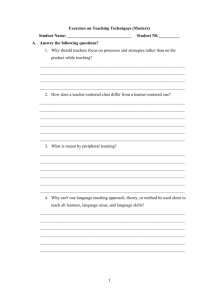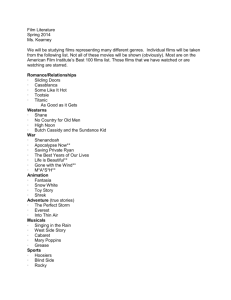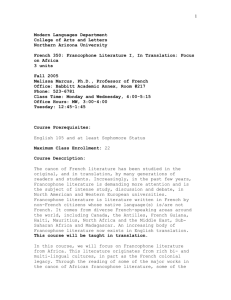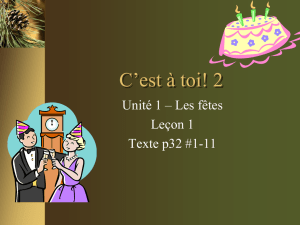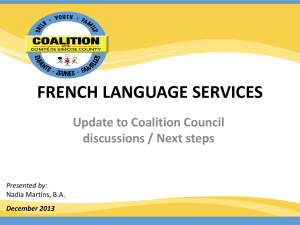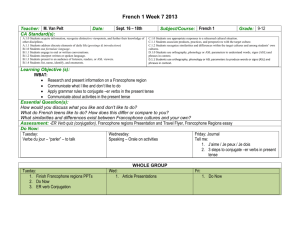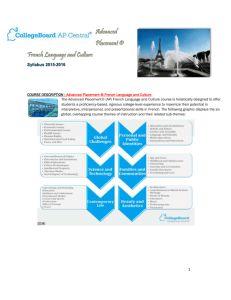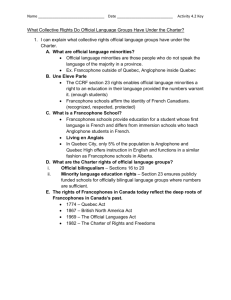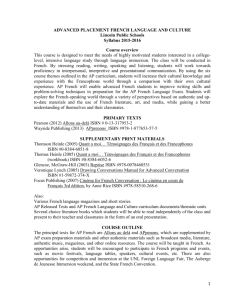Advanced French classes – Spring 2016
advertisement
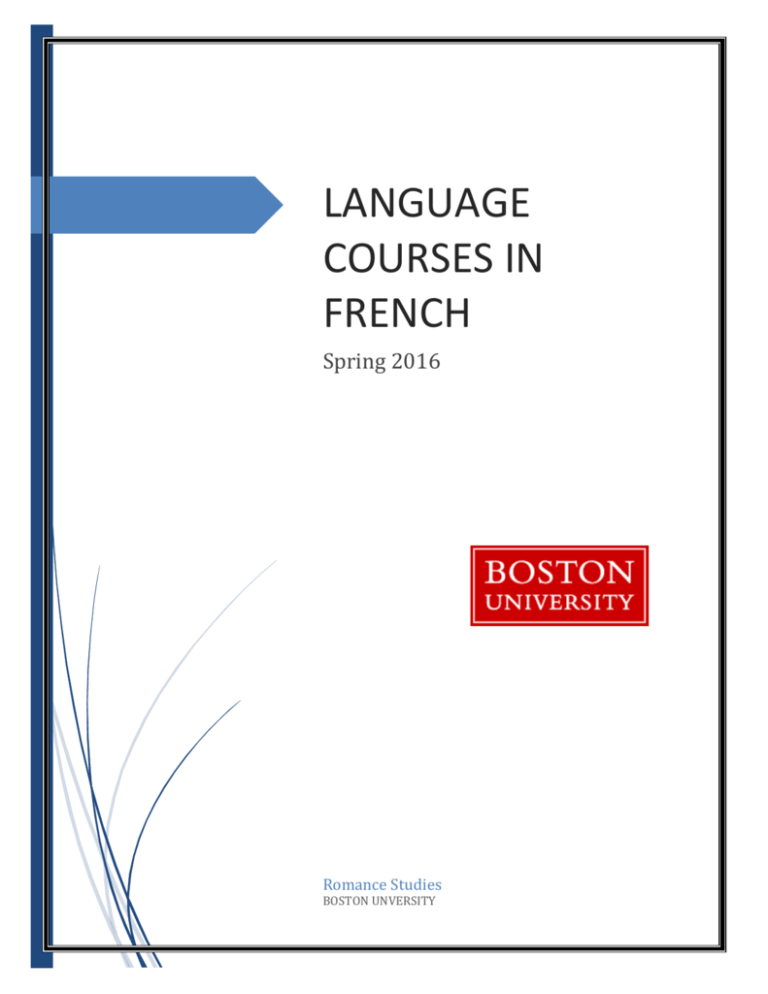
LANGUAGE COURSES IN FRENCH Spring 2016 Romance Studies BOSTON UNVERSITY LANGUAGE COURSES IN FRENCH – Spring 2016 LF 111 First Semester French A multimedia approach for students who have never studied French. A variety of communicative tasks develop speaking, listening, reading, and writing skills. LF 112 Second Semester French Continues CAS LF 111. A multimedia approach which develops speaking, reading, writing, and listening skills, together with the grammar and vocabulary needed for more complex communicative tasks. LF 211 Third Semester French Continues CAS LF 112. Authentic literary selections, cultural readings, and discussion of shortsubject films, accompanied by advanced study of grammar and emphasis on communicative skills. LF 212 Fourth Semester French Continues CAS LF 211. . Authentic literary selections, cultural readings, and discussion of films, accompanied by advanced study of grammar and emphasis on creative oral and written exercises. Fulfills CAS language requirement, prepares for further study (LF 303). LF303 French Composition and Conversation: Topics based courses exploring various aspects of French and Francophone literature, culture, and society. In the context of each section's unique theme, students advance proficiency in speaking, writing, reading, and listening. LF303 A1 Cross Continental Connections (Lakin-Schultz) French is spoken widely on the continent of Africa and while the number of speakers continues to grow, understanding the complicated history driving this ongoing linguistic influence allows us to develop a cultural fluency that is indispensable in Africa and Europe alike. This course seeks to improve students’ proficiency in speaking, reading, writing, and listening through the discussion of images, short stories, excerpts of novels, and films that address the relationship between France and several of its former colonies, notably in West Africa, from colonial times to the present. Though we will begin with an introduction of French colonialism through the study of images and propaganda portraying the colonies, we will soon shift our focus to readings and films that address this relationship from an African perspective. The course will progress chronologically ending with a study of the nature of this relationship in the 21st century through the readings of the Senegalese writer, Fatou Diome. Activities will include small group work, two peer edited compositions, class discussion, and a blog for additional writing practice. There will be two formal assessments of oral proficiency and one final group presentation. Themes explored include colonialism, education, African culture, migration, and cultural identity LF303 B1 Francophone North America (Roy) French has been continuously spoken on the North American continent since the establishment of French colonies in the Maritimes and Quebec, as early as 1604. Today, in Boston, we know that we are geographically close to Francophone regions of Canada (Quebec to our North, and the Atlantic provinces to the Northeast), but it is less wellknown that people of French ethnic background form a significant part of the population right here in New England, too. Furthermore, French-speaking communities still thrive in the U.S., not only in LANGUAGE COURSES IN FRENCH – Spring 2016 Louisiana, but in New England states such as Maine, and New Hampshire. In this course, we will explore the history, culture, and broad movement of people to, from, and between these regions (and others) over time. This course seeks to improve students’ proficiency in speaking, reading, writing, and listening through the discussion of literature and artwork (images, songs, short stories, excerpts of novels, and films) that examine this subject. Activities will include class discussions, small group work and written compositions, as well as formal assessments of oral proficiency. Themes explored will include: migration, cultural identity and diaspora. LF303 C1 Secrets, Lies and Family Ties (Hennessey) This course is designed to expand students’ linguistic and cultural competencies in French through discussions of literary texts and contemporary films and articles. We will explore different kinds of lies (including le “non-dit”) and other subtopics, such as the education of children and adolescents, the challenges of “growing up”, and the various patterns of (mis) communication originating in the family and extending to other relationships .We will do close readings from the following genres: short stories, articles by psychologists, philosophers, anthropologists and journalists, 7 chapters from the contemporary novel, “L’élégance du hérisson”; and we will watch (subtitled in French) “Le Hérisson”, a film adaption of the novel. For the final project, (an oral presentation and a written paper) each student will choose one contemporary feature film (from a selection of 20) and will examine how the course themes are revealed, represented, and resolved. Authors include Eugène Ionesco, Tahar Ben Jelloun, Andrée Chedid, Marie Desplechin and Muriel Barbery. LF303 D1 French Through the Media (Bekkai) This course will promote the development of core language skill sets through the use of media. Students will investigate French and francophone media in all forms, including the written and broadcast press, film, television, podcasts, blogs and social media, as a conduit for enhancing students’ understanding of French culture. LF305 Advanced Written Expression (Duséwoir): Intensive study of the art of writing through translation exercises and development of individual style through readings, analysis of writing styles, free composition and class discussion. LF 306 Advanced Oral Expression (Hawkes): Advanced training in rapid and idiomatic French speech. Oral reports. Role playing. Vocabulary building; Targeted work on pronunciation, intonation, and aural comprehension. LF 348 Cilivilsation française et francophone (Duséwoir): Dans ce cours, nous aborderons les principaux aspects de la civilisation française et francophone à travers six grands dossiers thématiques, composés de documents variés et offrant la possibilité de connaître, réfléchir, discuter et s'exprimer sur I’actualité francophone. Les six dossiers thématiques sont les suivants: l’histoire, de la préhistoire à nos jours; la géographie; la culture et la citoyenneté; l’art; la société et l’économie; Les sciences et les technologies. Il s’agira non seulement de développer une culture générale et de stimuler la curiosité, mais d’aiguiser des compétences de compréhension, production et présentation, interaction et recherche, individuellement ou par groupes.
